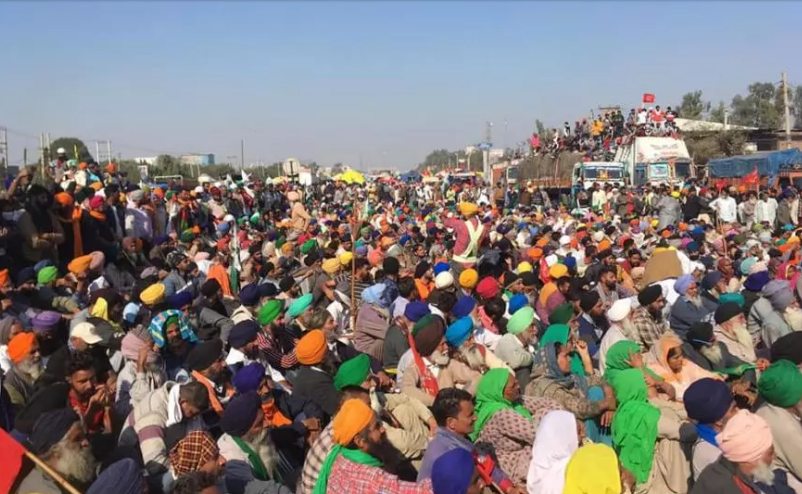Bharat Bandh: Farmers Get Support from Across the Country

There are times when years pass without anything happening, then come weeks when years happen, to paraphrase a famous saying about history. This is what has happened in India in the past few weeks. In about a fortnight, a seemingly invincible government is floundering and groping, unable to deal with a mass movement that has stirred up the country, and drawn international comment.
Tens of thousands of farmers are camping on all major highways entering the capital, Delhi, thousands more have held solidarity actions across the country, workers and employees have come out in support, and even the middle class is shaken and stirred. Belated talks have ended in a deadlock because the government still doesn’t recognise what it is facing.
Now, the situation has escalated far beyond what Prime Minister Narendra Modi, Home Minister Amit Shah and their adivsers would have ever imagined. Farmers have called for a ‘Bharat Bandh’ or general strike on December 8. Support has poured in from hundreds of organisations, both farmers’ and those representing people from other sections of society, including 10 central trade unions.
In the past couple of days, over 18 political parties, many with strong regional bases, have openly supported the farmers’ call. It is fairly certain that the bandh will be successful. Faced with a united opposition, Modi and his government are floundering on how to deal with the anger directed at them.
Series of Blunders
It started with a march to Delhi planned for November 26-27, coinciding with a one-day industrial strike that reportedly saw tens of millions workers participating. The government decided that it would nip the whole thing in the bud by using police and paramilitary forces to stop the march – a grave miscalculation that fired up the protesters and roiled the country.
Not only did the farmers break through some nine barricades over a hundred kilometers facing teargassing, casting aside concrete blocks and shipping containers put up as road blocks by a clueless police, but their resolve and energy inspired thousands more to come out in support. The government decided to climb down, and allowed them to settle at the borders, inviting leaders for talks. But a series of such ‘negotiations’ revealed that there was no meeting ground: the farmers wanted repeal of the laws, the government was only offering some cosmetic amendments, and promises.
Only once before in his six-year tenure as Prime Minister has Modi been forced to back down in the face of a popular movement – that was in 2015 when the hated Land Acquisition Ordinance was withdrawn after a massive protest movement by farmers. Since then, Modi has won another election, pushed through many far-reaching changes provoking long drawn protests, but never backed down. This is not the sign of sagacity or strength – it is hubris. But it looks as if this has met its match now.
The Modi government’s obstinacy to push through all kinds of economic legislation and policy that nakedly benefits big business and traders, including foreign capital, and his well known softness toward industry tycoons – both Indian and US – was causing this simmering anger that has now burst out.
The Agrarian Policy Disaster
Ever since Modi swept to power in 2014, he and his Bharatiya Janata Party-led government had played hide and seek with farmers. A deepening agrarian crisis with falling returns for the farmers, increasing debt, suicides, stagnating wages for field labourers, increasing ecological stress and no industrial options for jobs, was leading to periodic outbursts of discontent. But perhaps buoyed by electoral success or perhaps just by a dangerous inability to understand, the Modi government blithely continued, doling out some handouts here, launching some scheme there, and fixing numbers if necessary. This couldn’t have lasted for long.
Three farm-related laws, born as ordinances in June (when the pandemic was raging and chances of protests were low) were later converted to full-fledged laws in September by brute force in Parliament. Farmers immediately protested, with more vigour, especially in Punjab. But such is the hubris of the government that they thought they will ride it out like other challenges. They also passed various Labour Codes that dismantled existing protective laws, leaving workers and employees at the mercy of employers.
The farm laws are, taken together, like a sledge hammer taken to existing agrarian system of everything from cultivation to sale-purchase of produce, down to even storage and pricing. Not that the existing system was perfect, but at least it ensured some government subsidies to the hapless farmers in the form of Minimum Support Prices for commodities that were procured by government, to be channelised into the public distribution system. All that will go as private traders or proxies of big agri-business (both domestic and foreign) will be allowed free play, undercutting government procurement, determining what is to be cultivated (through contract farming), hoarding food commodities without stock regulation and even having the license to fix prices for the sale of their hoarded stocks.
Repealing Farm Laws Only Way Out
In a country where over 80% of farmers are small and marginal, the retreat of the government and the entry of corporate sharks would sound a death knell. The farmers instinctively smell the danger. And, they rightly know that this will ultimately lead to losing their land to these sharks.
This is where Modi and his advisers went spectacularly wrong. This is where their shallow understanding of both farming, and Indian farmers went fatally wrong. They thought they could push through anything, ride out ritual protests and emerge as heroes of Big Capital in the end. Those with massive investments in retail chains and agro-processing would have egged the Modi government on, and we all know how irresistible their charms are for the present government.
And so, the Modi government has painted itself into a corner with no way out.
The farmers’ movement has turned out to be much more resilient, much more widespread and much more astute than Modi had ever imagined. The laws are universally seen as attempts by corporates to grab land and turn farmers into wage earners. Consumers fear that prices of essential food items will skyrocket, those dependent on subsidised foodgrain fear the system will collapse.
Another round of talks between farmers and the government is scheduled for December 9, a day after the bandh. That’s an opportunity for the government to show some wisdom and back off. Otherwise, the newly forged unity of Opposition parties, the vast farmers’ movement and its convergence with other working people and the ongoing economic crisis is going to upend all of Sangh Parivar’s dreams.
Get the latest reports & analysis with people's perspective on Protests, movements & deep analytical videos, discussions of the current affairs in your Telegram app. Subscribe to NewsClick's Telegram channel & get Real-Time updates on stories, as they get published on our website.
























